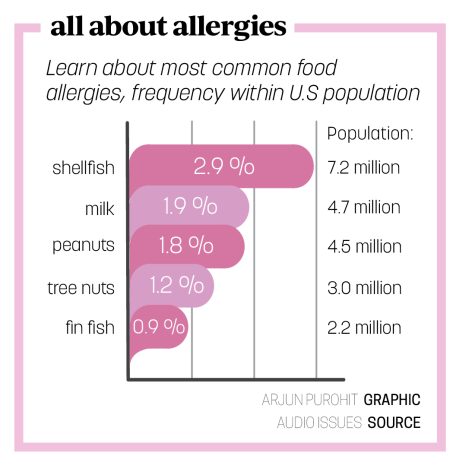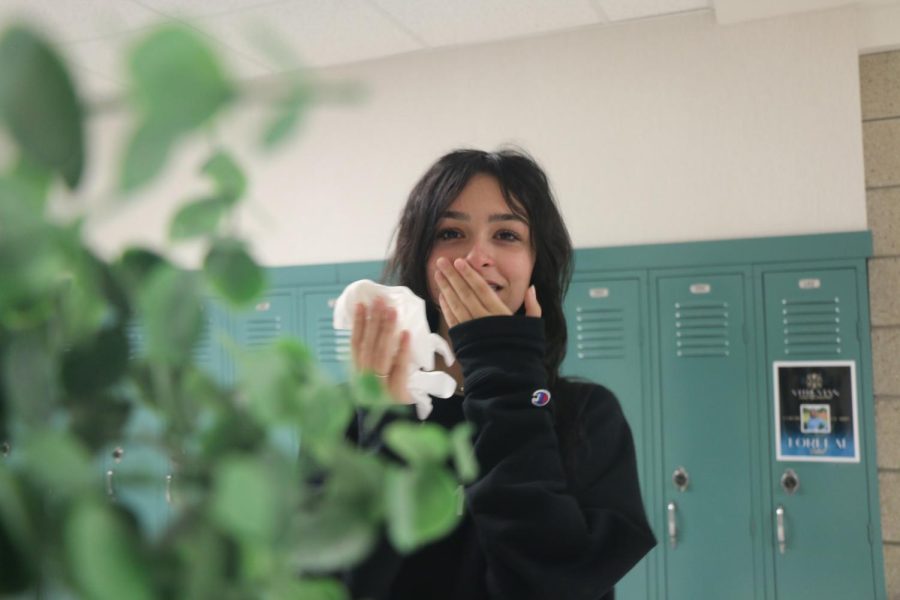Sophomore Dolly Metzger deals with seasonal allergies. They said allergies affect their day-to-day life and make them hesitant to do some activities.
“I deal with allergies every day of my life,” Metzger said. “Sometimes, I wake up and I just don’t want to go to school.”
According to Metzger, seasonal allergies have multiple effects. These symptoms range from a stuffy nose to having severe headaches and drainage. They can also cause the opposite, a dry nose and nosebleeds. While taking allergy medicine can help, Metzger said it doesn’t alleviate every symptom and can still cause them to feel sick.
“I take an allergy pill in the morning,” Metzger said, “But, it can only do so much to help. (For) the rest, I have to just push through.”
Metzger’s not the only student who struggles with seasonal allergies. Sophomore Anna Hesser said her allergies make her nose and throat hurt. She said she takes allergy medicine daily to help subside some of her symptoms, but she doesn’t like to go outside during the seasons where her allergies affect her the most.
Hesser said, “I definitely get scared when I try to smell flowers because I don’t know if I’m going to end up sneezing.”
Nurse Jerad Kempson, who works at the health center at CHS, said students sometimes find it hard to tell the difference between a cold and allergies.
“In my opinion, fall has more students coming in and complaining of allergies,” Kempson said.
Kempson said the go-to for helping students with allergies is to provide them with cough drops, ibuprofen and plenty of water. He said students usually are able to push through and do not have to miss school because of their allergies.

“They usually power through because it’s something that they have to deal with every day,” Kempson said.
However, Metzger said allergies can be very difficult to deal with, making it hard for them to concentrate in class and stay awake. They said it also prevents them from spending too much time outdoors. They try their best to do indoor activities and will go outside only if they have to.
“Sometimes I just won’t want to go outside because I don’t want to deal with it,” Metzger said. “I usually stay inside for that reason.”
Like Metzger, Hesser avoids the outdoors.
“During the spring, I try not to go outside much because when I do I always start sneezing and uncontrollably sniffing,” she said.
Metzger said allergies also make it so they will not work in certain places or go outside very often.
“Even though I have pets at home, I probably won’t be able to work with animals when I get a job, since I won’t be accustomed to them,” they said.
Hesser also said she has problems at work due to her pollen allergies. She said she works at a restaurant and sometimes the flowers there will trigger her allergies.
“I’ll just be working and then suddenly my nose will start running,” Hesser said.
Though allergies can be difficult, Kempson said most students he sees push through their symptoms.
“The only thing that students usually go home for is when they’re so congested that they can’t think,” he said. “But other than that, they just keep going.”
Hesser said she has never had to miss school because of her allergies, though she said she has gotten cold-like symptoms and a fever due to the spring-time pollen.
“One time I got really sick and started to have a fever all because of pollen outside during the spring,” Hesser said. “And my allergies sometimes have caused nosebleeds because my nose can get so dry.”
Metzger said they agreed.
“I take my medicine in the morning and then go to school,” they said, “even if I do feel totally crappy.”
Ultimately, Hesser and Metzger agreed allergies can be annoying, but said it’s crucial to push through.
“Don’t be embarrassed if you’re in class sniffing,” Metzger said. “Nobody really cares, and you can’t help it. So just blow your nose, and move on.”































![What happened to theater etiquette? [opinion]](https://hilite.org/wp-content/uploads/2025/04/Entertainment-Perspective-Cover-1200x471.jpg)














































![Review: “The Immortal Soul Salvage Yard:” A criminally underrated poetry collection [MUSE]](https://hilite.org/wp-content/uploads/2025/03/71cju6TvqmL._AC_UF10001000_QL80_.jpg)
![Review: "Dog Man" is Unapologetically Chaotic [MUSE]](https://hilite.org/wp-content/uploads/2025/03/dogman-1200x700.jpg)
![Review: "Ne Zha 2": The WeChat family reunion I didn’t know I needed [MUSE]](https://hilite.org/wp-content/uploads/2025/03/unnamed-4.png)
![Review in Print: Maripaz Villar brings a delightfully unique style to the world of WEBTOON [MUSE]](https://hilite.org/wp-content/uploads/2023/12/maripazcover-1200x960.jpg)
![Review: “The Sword of Kaigen” is a masterpiece [MUSE]](https://hilite.org/wp-content/uploads/2023/11/Screenshot-2023-11-26-201051.png)
![Review: Gateron Oil Kings, great linear switches, okay price [MUSE]](https://hilite.org/wp-content/uploads/2023/11/Screenshot-2023-11-26-200553.png)
![Review: “A Haunting in Venice” is a significant improvement from other Agatha Christie adaptations [MUSE]](https://hilite.org/wp-content/uploads/2023/11/e7ee2938a6d422669771bce6d8088521.jpg)
![Review: A Thanksgiving story from elementary school, still just as interesting [MUSE]](https://hilite.org/wp-content/uploads/2023/11/Screenshot-2023-11-26-195514-987x1200.png)
![Review: "When I Fly Towards You", cute, uplifting youth drama [MUSE]](https://hilite.org/wp-content/uploads/2023/09/When-I-Fly-Towards-You-Chinese-drama.png)
![Postcards from Muse: Hawaii Travel Diary [MUSE]](https://hilite.org/wp-content/uploads/2023/09/My-project-1-1200x1200.jpg)
![Review: "Ladybug & Cat Noir: The Movie," departure from original show [MUSE]](https://hilite.org/wp-content/uploads/2023/09/Ladybug__Cat_Noir_-_The_Movie_poster.jpg)
![Review in Print: "Hidden Love" is the cute, uplifting drama everyone needs [MUSE]](https://hilite.org/wp-content/uploads/2023/09/hiddenlovecover-e1693597208225-1030x1200.png)
![Review in Print: "Heartstopper" is the heartwarming queer romance we all need [MUSE]](https://hilite.org/wp-content/uploads/2023/08/museheartstoppercover-1200x654.png)



